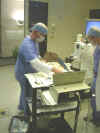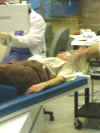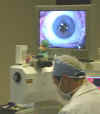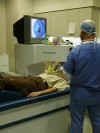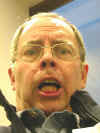BJ (and
Tony)'s Lasik Surgery
Lasik Plus
200 Galleria Parkway Suite 200
Atlanta, GA 30339
January 2, 2004
I have been wearing glasses since the 3rd grade and contacts since the 8th
grade. My contacts are (were) extended wear, gas permeable lenses that I only took
out about once a month (once a week is what I told my ophthalmologist). My vision
was about 20/400 without correction. I would have been considered legally blind but
thankfully with contacts, my vision was correctable to 20/20. (Legal blindness
refers to clinically measured visual acuity of 20/200.) I never had a problem with
my contacts beyond occasional grit or pollen, so I wasn't particularly interested in Lasik
and had never considered it until I went to watch a friend having it done. I was
fascinated by how automated it has become. I took great comfort in seeing that it is
controlled by software, so that the element of human error is minimized. I decided
then and there that I was ready to do it.
Now, let me rant about the government for a few minutes because, of course, some bureaucrat invented something called a Flexible Spending Account (FSA) to complicate all medical related issues. Because Lasik is not covered by my insurance and is a fairly expensive procedure, I wanted to pay for it with tax-free dollars. You can't just report the expense and not pay taxes on it. Oh No. You have to set the money aside in an FSA so that some 3rd party gets a fee for administering the account. And, of course, this can only be done once per year. I say all of this so that I can complain about having to wear my glasses for six weeks. To have the initial examination and get an estimate of the cost, I had to take out my beloved contacts for at least 21 days (only 3 days are required for soft lens wearers). I did this in November so that I could meet the deadline for FSA elections for 2004. When I left the office after my examination, I put my contacts back in for a few weeks and then took them out again in December in anticipation of my January surgery. This may not seem like such a big deal to you, but anyone who has to look through the bottom of coke bottles to see will appreciate what a huge sacrifice this is.
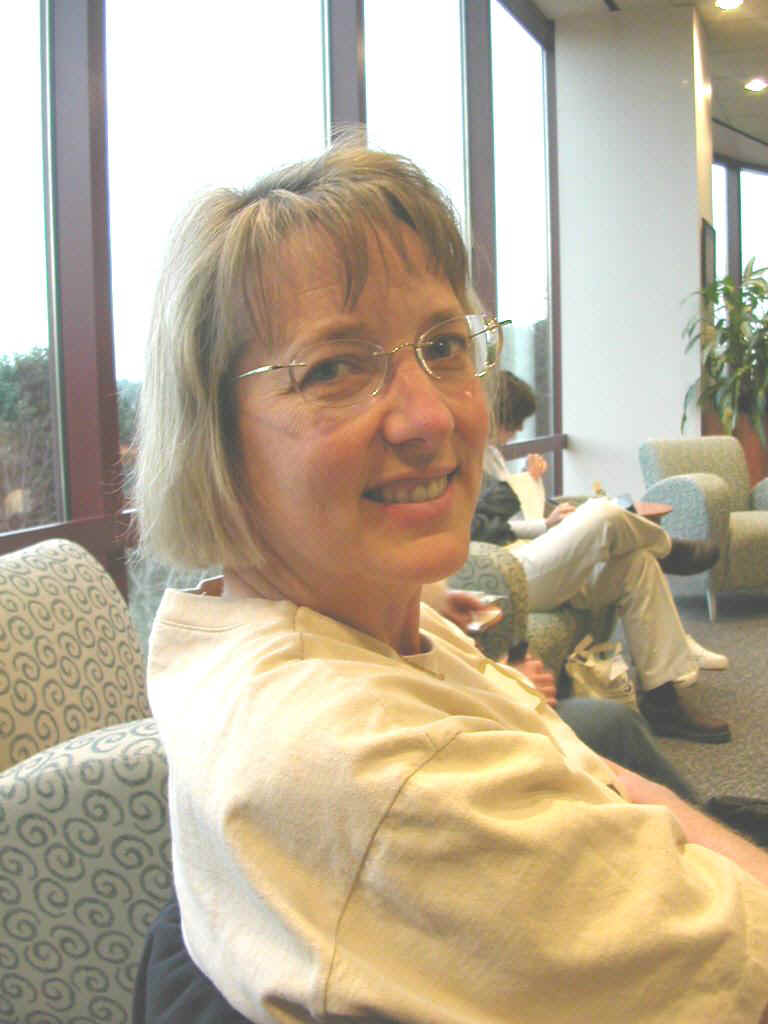
Okay, that's all of my ranting. Thank you for listening. On to the more interesting part...
With January 2nd approaching, I realized that I had nothing to wear to the surgery, so I designed this T-shirt.
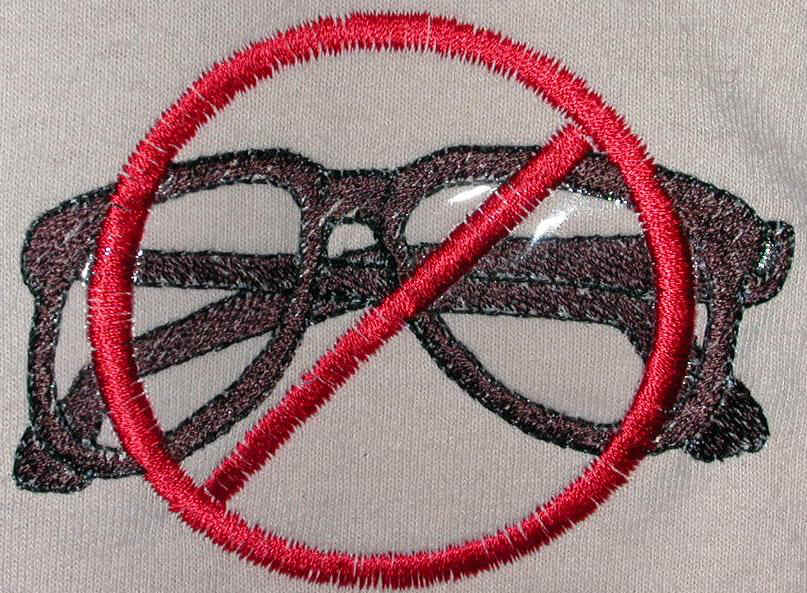
My appointment was at 3:20PM so I had all morning to get nervous about it. I arrived at around 3:00PM so I would have enough time to fill out any paperwork before my appointment. I had WAY plenty of time. Apparently they had overbooked the 3:20 time slot by about 10 people. My surgery wasn't performed until 6:00PM! By the time I had watched all of the people before me have their surgery, I was pretty nervous. I think Tony was more nervous than I was, so he wasn't much comfort. Jeff Miles a disc jockey from Q-100 was the only person that seemed more nervous than I was. They gave him valium before his surgery.
I had a brief meeting with the doctor so that he could explain all of the risks to me before the surgery (pretty scary stuff). See http://www.fda.gov/cdrh/LASIK/risks.htm for a detailed list of them. I explained that I wanted to have the monovision (to eliminate the need for reading glasses). This means that I would have one eye corrected for distance vision, and the other corrected for near vision (which means that it is undercorrected for distance). I had already been using this method with my contacts. The doctor wasn't enthusiastic about it because a lot of people can't get used to it. He said that if I don't like it, I will have to wait at least 3 months to have the under corrected eye fixed. I signed an acknowledgement that he had explained all of the risks.
When they finally called me in, the nurses and doctor were admiring my T-shirt and I was in such a panic, I was barely able to respond. They gave me a lovely hair-net to wear and asked me to lie on the table.
Click on any of the photos to see an enlargement:
The operating theater is surrounded by glass walls and the camera is aimed at the patient's eye so anyone in the waiting room can watch the surgery being performed. Tony wasn't very interested in watching but I insisted that he take some photographs. These aren't too gory - just pictures of my eye being held open by a speculum while they put some VERY COLD numbing drops in it. If you click on the pictures to enlarge them, you can see that they have taped my eyelashes.
Next, they created the flap. They put a ring on my eye and applied suction to my cornea. This was VERY uncomfortable but not painful. Something like a can opener rotated around the ring to cut the flap in the cornea. Then more COLD drops and the doctor lifted the flap and folded it back and used something that looked like a pointed q-tip to dry my eye. I couldn't really see or feel any of this except the pressure from the suction and the COLD drops. Don't click on this picture if you are squeamish. If you aren't, its a pretty cool picture.
As you can see, Tony is quite squeamish.
Before the doctor started the laser, he explained that it would be loud and that I might smell a funny smell. I think he said that I should look at the red light. All I could really see was a red blur with something like 3 or 4 white blurs around it. I don't really remember much about the sound, but I did smell something like burning hair. After the laser was finished more COLD drops were administered and the flap was put back into position. A shield was put over that eye and the other eye was done. When both eyes were finished, I laid on the table for 2 or 3 minutes with my eyes closed and then was led back into the doctors office for my post-op consultation. The post-op picture is a little blurry because Tony didn't want to use the flash in my new eyes, but that is sort of indicative of my vision at that point. It was VERY cloudy - sort of like my vision with my contacts before their monthly cleaning.
I was instructed to go home and take a 2 hour nap because the worst symptoms are during the first two hours after surgery. My worst symptoms were the panic attacks that were induced by reviewing all of the risks involved. I kept imagining that my flap was wrinkling or tearing. I napped a little over an hour (wearing the lovely goggles I had been given to sleep in), got up and had dinner and then went back to bed. When I awoke the next morning, I was disappointed to find that the alarm clock was blurry, but I could read it. When I turned on the lights in the bathroom, my vision was much better. We went back to Lasik Plus for a check-up where I was told that my correction was text-book perfect!
Update:
As it turned out, my correction was NOT text-book perfect. My eyes healed very well, but my vision was not perfect. The following weekend after the surgery I went on a ski trip to Salt Lake City. I had absolutely no problem seeing in the bright sunlight on the slopes but when I was making the drive from the slopes back to Salt Lake City in the dark, I struggled to see where I was driving. I assumed that it was probably due to halos I had been told to expect. I continued to use the eye drops as prescribed and went in for my regular check ups but I was very disappointed with my vision. When I went back for my second check up, the doctor said that they had not achieved the desired correction in my right eye. I asked the doctor to prescribe glasses for me. (I'll put in a plug here for For Eyes. If you need cheap glasses - take an old pair of frames to For Eyes and they'll put lenses in them for $40!) With the glasses, I was able to see 20/20, but since I HATE wearing glasses, I was unhappy and felt like I had spent a lot of money for nothing. I went back for a third checkup and the doctor said that my eyes had stabilized enough for an enhancement.
I arrived about 20 minutes early for my 1PM enhancement appointment and signed in at the desk. I was instructed to take a seat in the lobby and wait to be called. At about 5 minutes after 1, I was called to the desk to sign consent forms, given a nametag and told to wait in the lobby. Shortly after 2PM I was taken into an examining room where they gave me an electronic pre-test. (This involves looking into an instrument showing a balloon in the distance. The balloon goes in and out of focus while the curvatures of the cornea are measured and a prescription estimate is made.) I was told to wait in another examining room for the doctor. After about 15 minutes, the technician told me I could wait in the lobby. At around 2:30 I was finally called in for my consultation with the doctor. I waited for almost 10 more minutes for the consultation. I examined every piece of literature on the desk, on the wall and finally went back out to the lobby to get a newspaper. Eventually the doctor came in. He looked into my eyes with a bright light and asked if I had any questions. When I didn't, he sent me back out to the lobby to wait some more. By this time I was REALLY getting frustrated with the wait. I had already read everything in the lobby, played innumerable games of solitaire on my IPAQ, sent a number of text messages AND worked the AJC Crossword puzzle, so I started to pace. My husband noticed that someone who had come in after me was being called for his procedure so my husband went to the desk and asked them how this had happened. One of the workers came over to apologize and say that I would be next. At this point, I couldn't hold in my frustration any longer so I asked for an explanation of the extended wait times during BOTH of my procedures. Her explanation was that in the literature I had received describing the procedure it said to expect to be in the office for 1-4 hours. I asked her to elaborate on what exactly was being accomplished while I was in the office for 1-4 hours. She said that the doctor was doing consultations with other patients and then they had to sterilize the instruments. I expressed my disbelief that the combination of those activities could explain the wait time of 2 hours & 40 minutes for my first visit and almost 3 hours for this visit. She assured me that there were no improvements that they could make to shorten the wait time and that all LASIK offices had the same kind of wait for their procedures. I could see we had reached an impasse so I decided to stop wasting my breath on her. After she left, a fellow patient shared his observation, "It took longer for her to explain that than it would to fix the problem." As soon as the doctor finished with the previous surgery, the explainer held a whispering conference with him. At this point, they evidently decided that my husband and I should be separated from the other patients in the lobby so they asked us to wait in a private waiting room until my surgery.
Dr. Smith, who had been very cordial before, now seemed very curt and business like. During my first surgery he had explained each step as it occurred and made sure I knew what to expect. This time he had very little to say and I was quite surprised when the flap was created by hand rather than with the machine they had used before. With no warning, they started using the laser. They never even said to hold my eye still or look straight ahead or anything. The procedure was over in about 2 minutes and I was sent out to have the doctor look into my eye. He said it looked fine, gave me his business card and some referral cards and sent me on my way.
Back home, I followed my post-op instructions, keeping my eye closed for three hours and then applying drops. When I woke up the next morning things were still a bit hazy but I could already tell my vision was improved. I had an 8 AM follow up appointment where I was given a clean bill of health and told that I didn't need to return unless I experienced any problems. I wasn't sure whether this was standard practice for an enhancement or because I was being punished for complaining about the wait.
At any rate, I am very pleased with my vision. The monovision is working great and the "halo" effect around lights has diminished significantly. I'm glad because I don't think I could stand another 3-4 hour wait for another enhancement!
Another Update:
A couple of days after the surgery, I decided to send an email to LASIK Plus asking, "When I come in for a Lasik Procedure how long can I expect to be in the office and what activities will take place during that time?" The response?
"Hello BJ.
The actual surgery takes about 15 minutes! You'll come in about 45minutes before that to get "prepped", which basically means your nurse will apply eye drops and such. After surgery you will go home and sleep for several hours to rest your eyes. That's basically about it!
BEFORE your treatment date, you must come in for a 90 minute NO cost exam to determine IF you're a good candidate for lasik and if you are, which of the lasers that we use would be best for your individual needs and treatment.
Please call us at 1-800-334-2224 seven days a week to schedule your NO cost exam!
Best regards,
(Name withheld)
Patient Communication Center representative"
Sounds like the Galleria Office staff and the Patient Communication representative are working from different scripts!
I know after reading all of this ranting, you're probably just thinking that I am a cronic complainer but I am hoping that somehow my complaining might save some other folks from a lot of wasted time (not just the patient, but the driver too). And, as I explained to person at LASIK Plus its not just the wasted time, but people get very apprehensive about the surgery when they have to wait so long. I'm not usually a complainer, and I probably chose a poor time to become one, but thankfully, so far I haven't seen any detrimental effects as a result of my complaints.
Another Update (October 11, 2007):
The squeamish Tony (see above) decided to have his eyes done! He went to Woodham's Eye Clinic for his surgery. He liked the idea of the no-knife Wavefront Intralase method for cutting the flap. It was a little more expensive than my surgery. The experience of the surgery was more pleasant than mine. We were only in the office for a couple of hours. Tony's biggest complaint was how long they made him wait to take a Valium.
He wanted it when we walked in the door, but they wanted him to be coherent when he met with the doctor and signed the release forms.
They don't have quite the theater that LASIK Plus has, but they do have a TV screen in the waiting area where a family member can watch the surgery. Here are some photos of Tony's surgery. Click to enlarge.
So far, Tony hasn't gotten the exact results he was hoping for, but the doctors tell him that he will continue to see some changes over the next few months. He wanted mono-vision with his left eye being his reading eye. At his first checkup, his left eye was 20/20 and his right eye was about 20/25 or 20/30. He can't read without reading glasses which is a disappointment, but he is very happy with his distance vision. He does not seem to see halos even when driving at night.
Send me an email if you're thinking about LASIK. I'd be happy to talk to you about it and I won't go on and on about the wait unless you want me to: bj@bjandtony.com (or if you are interested in learning about Woodhams or Intralase, you can email Tony: tony@bjandtony.com)
Frequently Asked Questions:
I've gotten a lot of emails from folks considering the surgery. Here are a few of the more frequent questions:
Vicki: The 3-4 hour wait is awful. Did you check
anywhere else?
BJ: I went to two places to get prices and they were comparable.
I didn’t know about the 3-4 hour wait until after I had paid for the
procedure.
Susan: I was wondering if you checked out a
number of doctors before choosing Lasik Plus. Had you heard anything about them
specifically?
BJ: I didn’t really “shop around”. I
went to one other place (The Lasik Institute) and I was so put off by their car salesman
like atmosphere that I chose not to go back. I think most of the places are pretty
comparable, but you might want to find someone who has used the actual doctor/facility
that you are thinking about going to and get a recommendation. It would be easy to
get “Analysis Paralysis” though, so I wouldn’t spend too much time doing
research or you’ll never do it. At some point, I think you just have to make a
decision and do it!
Susan: Overall, despite having to get yours
tweaked, was it worth it to you?
BJ: My Lasik experience is becoming a distant memory. It
seemed like such a huge deal when I had it! I have been very happy with the results.
Susan: Did they tell you there was a possibility of
having to adjust the vision? How long did you end up waiting before they
readjusted yours?
BJ: I think it was 3 or 4 months between the surgery and the
enhancement. I made them write me a prescription for some glasses and once I got
them, it wasn’t too bad because they were SO much lighter and smaller than my old
glasses. I think they told me that I might have to have an enhancement, but they
said so many things, I don’t remember exactly.
Susan: My other eye doctor told me I would have to
have my lenses out for at least 21 days, but when I made the appointment to have my eyes
evaluated, they said my lenses only needed to be out for 3 days, and that they could
actually perform the Lasik surgery that day, if I was up for it. These seem like
contradicting ideas, no?
BJ: They told me 21 days for hard lenses because they reshape your
cornea and only 3 days for soft lenses because they don’t. If you wear hard
lenses, I would definitely do the 21 day regime.
Denise: I am afraid that they won't get my vision
right the first time (I have a high prescription and am considered legally blind without
glasses/contacts), so I'm afraid of being stuck with glasses don't that fit anymore, but I
still can't see well, like what happened to you!! How long did it take for For Eyes
to prepare your new glasses?? Was it a quick turn around (days or weeks)?
BJ: I think they say that it will take a week, but my husband
recently got two pair there in 3 days.
Denise: I suffer from mild dry-eye. I mentioned
this several times during the consultation, and they don't seem to think it's a big deal,
but I have read horror stories about people having to wake up every hour at night to peel
their dry eyes open and apply drops. Did you experience any dryness? If so, how bad
was it?
BJ: The dry eye thing was not a problem for me. I applied the drops
just as instructed and did not have to wake up in the night to do it. I don't remember
having a problem with my eyes being dry before LASIK, unless I slept under a ceiling fan.
Darla: Are the prices about the same or higher for
those with poorer eyesight? My brother said should be about $3500. does that sound
right?
BJ: I think the prices are the same regardless of the person's
eyesight, but it is hard to say because both me and my husband had poor eyesight. My
surgery was just shy of $3000 and my husband's was just over $4000 (Intralase method).
